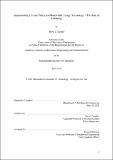Implementing Climate Policy and Renewable Energy Technology – The Role of Lobbying
Author(s)
Guettler, Darya C.
DownloadThesis PDF (1.892Mb)
Additional downloads
Advisor
Caughey, Devin
Terms of use
Metadata
Show full item recordAbstract
Climate Change has become an increasingly discussed issue in the United States and around the world. Despite levels of support of over 60% in all states, very little action has been taken on this front in the United States. Understanding how to effectively implement renewable energy technology and climate policy will be vital for moving climate legislation forwards in coming years. This thesis analyzes the role that fossil fuel companies play in lobbying on climate legislation, and uses theoretical models of lobbying to categorize the behavior of the companies.
Overall, lobbying was found to be skewed heavily towards the poles of climate opinion, namely those heavily in favor and heavily against climate policy legislation. It is found that lobbying expenditures from the largest oil and gas companies in the United States were related to the voting behavior of members of Congress from 2012-2020. Voting consistently against climate legislation was found to be a strong indicator for being lobbied by oil and gas companies. Members of Congress with anti-climate voting behavior were over two times as likely to experience lobbying. K-means clustering and PCA analyses also confirmed this, showing lobbying to be one of the largest predictors for categorizing behavior in Congress.
Date issued
2021-06Department
Massachusetts Institute of Technology. Department of Mechanical Engineering; Massachusetts Institute of Technology. Department of Political SciencePublisher
Massachusetts Institute of Technology